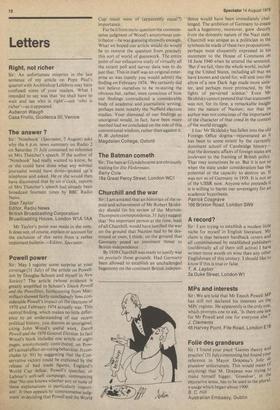Churchill and the war
Sir: I am amazed that an historian of the repute and achievement of Mr Robert Skidelsky should (in his review of the MortonThompson correspondence, 31 July) suggest that 'No important person at the time, least of all Churchill, would have justified the war on the ground that Nazism had to be destroyed or even, I think, on the ground that Germany posed an imminent threat to British independence ...'
By 1939 Churchill was ready to justify war on precisely those grounds. Had Germany been allowed to establish an unchallenged hegemony on the continent British indepen
dence would have been immediately challenged. The ambition of Germany to create such a hegemony, moreover, grew directly from the domestic nature of the Nazi state. Churchill was unique as a politician in the synthesis he made of these two propositions, perhaps most eloquently expressed in his statement to the House of Commons on 18 June 1940 when he uttered the sentence, 'But if we fail, then the whole world, including the United States, including all that we have known and cared for, will sink into the abyss of a new Dark Age made more sinister, and perhaps more protracted, by the lights of perverted science.' Even Mr Skidelsky cannot pretend that that statement was not, for its time, a remarkable insight into the nature of Nazism; nor that its author was not conscious of the importance of the character of that creed in the context of the world struggle.
I fear Mr Skidelsky has fallen into the old Foreign Office dogma—rejuvenated as it has been to some extent by the currently dominant school of Cambridge history— that the domestic affairs of foreign states are irrelevant to the framing of British policy. That may sometimes be so. But it is not so when the state under consideration has the potential or the capacity to destroy us. It was not so of Germany in 1939. It is not so of the USSR now. Anyone who pretends it is is willing to barter our sovereignty for an academic hypothesis.
Patrick Cosgrave 166 Brixton Road, London SW9


























 Previous page
Previous page